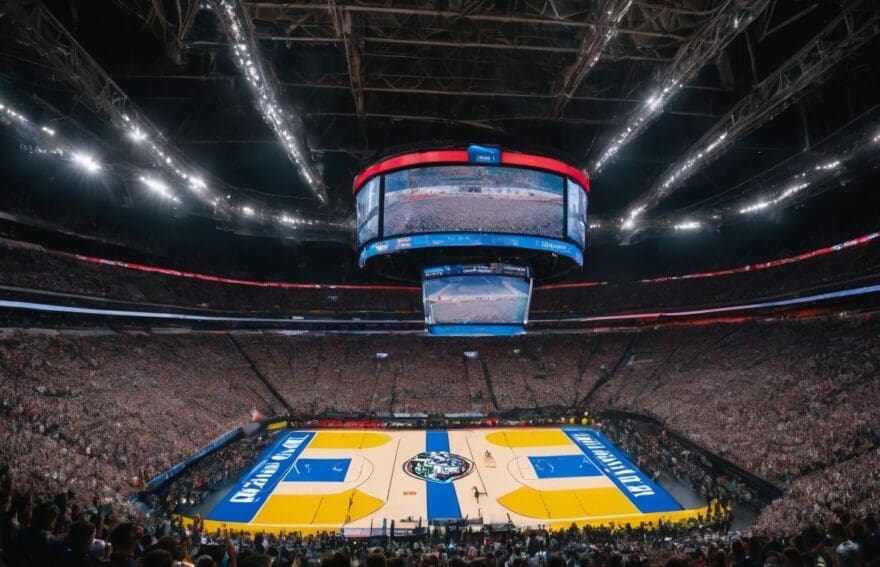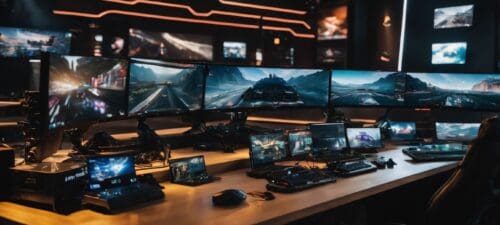Esports Event Management: Orchestrating Global Competitions

Updated On: October 24, 2025 by James Connolly
Are you captivated by the electric atmosphere of esports yet find yourself scratching your head at the complexity behind these dazzling spectacles? You’re certainly not alone. Our own curiosity led us to discover that a staggering 380 million enthusiasts have immersed themselves in the virtual thrills of esports in just the last year.
We’ve penned an article that acts as your personal guide through the intricate labyrinth of orchestrating and realising pulse-pounding international contests. So, join us as we delve into our findings and navigate the exhilarating currents of esports event planning with finesse!
The People Behind Esports Events
The success of any esports event is heavily reliant on a passionate and dedicated team who are responsible for planning, promoting, and executing the competition. Each member plays an integral role in creating a positive and inclusive community that fosters growth and development within the industry.
Importance of a passionate and dedicated team
Our success in esports event management hinges on the energy and commitment of our team members. Each person plays a pivotal role, from generating thrilling moments that captivate spectators to handling complex tournament logistics with precision.
Passion drives us to innovate and overcome challenges, ensuring each competitive gaming event is unforgettable.
We rely on a dedicated crew who share an enthusiasm for professional gaming, understanding its intricate dynamics. Their persistence sets the stage for global gaming events that not only entertain but also showcase elite competitive play, uniting fans across the world under the banner of esports excellence.
Roles and responsibilities
- A dedicated team ensures smooth functioning of the event
- Event managers handle logistics, scheduling, and coordination with participants and sponsors
- Responsible for ensuring fair play and enforcing competition rules
- Technical staff manage equipment setup and troubleshooting during the event
- Marketing team promotes the event to attract attendees and sponsors
- Security personnel maintain safety and order during the tournament
Creating a positive and inclusive community
Esports event management fosters a positive and inclusive community, promoting diversity and sportsmanship. By providing a platform for gamers from different backgrounds to come together, these events create opportunities for individuals to connect with like-minded individuals who share their passion for gaming.
This inclusivity encourages collaboration and mutual respect among participants, ultimately enhancing the overall experience for everyone involved.
Organising esports events also contributes to the development of a supportive and encouraging environment. The camaraderie that flourishes within this community helps nurture personal growth, teamwork, and leadership skills among players.
Aspects of Esports Event Planning
Once the goals and objectives are defined, choosing the right location becomes crucial for a successful event. Ensuring proper equipment and production value, setting up competition rules, and planning for successful live streaming are also essential aspects of esports event planning.
Defining goals and objectives
Esports event management begins with clearly defining the goals and objectives of the competition. These could include attracting a specific number of attendees, securing major sponsors, or setting a high standard for production quality.
By establishing these clear benchmarks, organisers can build a strategic roadmap towards achieving their desired outcomes. This helps to ensure that all efforts are aligned and focused on delivering an exceptional experience for both players and spectators.
In competitive gaming events, setting realistic and measurable goals also allows organisers to track progress and make necessary adjustments along the way. With so much at stake in esports tournaments, having well-defined goals enables teams to stay agile and responsive to evolving circumstances, ultimately contributing to the success of the event.
Choosing the right location
After defining the goals and objectives for your esports event, selecting the right location is paramount. The venue serves as the backdrop to your competition, offering an immersive experience for both players and attendees.
It’s essential to consider aspects such as accessibility, space requirements, and technological infrastructure when choosing a location. Additionally, leveraging data analysis in esports can guide you towards regions with a strong gaming community or areas where previous events have seen success.
When scouting for a venue, consider the demographic of your target audience. Ensure that the location aligns with their preferences and interests – this could mean seeking out vibrant city centers or embracing natural landscapes depending on your desired atmosphere Keywords: Event scheduling software, International competitions.
Ensuring proper equipment and production value
After carefully selecting the ideal location for your esports event, it’s crucial to ensure that you have the proper equipment and production value in place to deliver an engaging and high-quality experience for both players and spectators alike. Here are key elements to consider:
- High-quality Gaming Equipment: Investing in top-tier gaming hardware, including PCs, consoles, monitors, and peripherals, is essential to provide a seamless and competitive gaming environment.
- Professional Production Crew: Hiring skilled technicians, camera operators, sound engineers, and lighting experts will elevate the production value of your event, ensuring smooth operations and captivating broadcasts.
- Engaging Visuals: Incorporating dynamic graphics, LED displays, and stage designs can create an immersive atmosphere that enhances the overall viewing experience for attendees and online audiences.
- Pristine Audio Experience: Implementing state-of-the-art sound systems and acoustics ensures clear communication between players during matches and delivers impactful commentary for viewers.
- Broadcast Technology: Integrating advanced streaming platforms and software solutions enables seamless live streaming of matches with multiple camera angles, instant replays, and engaging visual overlays.
- Rigorous Testing: Conducting thorough equipment tests and technical rehearsals well in advance helps identify and resolve any potential issues before the event goes live.
- On-site Support Team: Having a dedicated team of technical support staff available throughout the event ensures swift resolution of any unexpected technical challenges.
Setting up competition rules
Setting up competition rules requires careful consideration to ensure fairness and maintain competitive integrity. Esports event managers must establish clear guidelines and regulations that govern player conduct and competition procedures. It’s important to create rules that promote a level playing field while fostering an environment that encourages skill, strategy, and sportsmanship.
- Define clear guidelines for player behaviour and fair play: Establish rules that outline acceptable conduct, penalties for unsportsmanlike behaviour, and mechanisms for dispute resolution. This ensures a respectful and professional atmosphere.
- Outline competition formats and structure: Determine the tournament format, including match types, seeding procedures, brackets, and tie-breaking criteria. This provides clarity on how the competition will unfold.
- Specify equipment regulations: Set standards for hardware, software, peripherals, and other technical requirements to ensure uniformity across competitors.
- Establish eligibility criteria: Define eligibility parameters such as age restrictions, player affiliations with teams or organisations, and any required qualifications or rankings.
- Clarify match procedures and timing: Detail match scheduling, game settings, map rotations, pause allowances, communication protocols between players during matches.
- Address anti-cheating measures: Implement measures to prevent cheating or unfair advantages such as unauthorised software usage or exploiting game bugs.
- Communicate rulebook extensively: Create a comprehensive rulebook accessible to all participants outlining all competition rules mentioned above in detail for transparency.
- Continuously evaluate and adjust rules based on industry developments and community feedback to maintain relevance in the ever-evolving esports landscape.
Planning for successful live streaming
To ensure successful live streaming for esports events, we must consider the following key aspects:
- Selecting a High-Quality Streaming Platform: Opt for a reliable streaming platform to ensure seamless broadcasting and engagement with the global audience.
- Implementing Engaging Commentary: Engage viewers with insightful commentary from experienced esports professionals, adding depth and excitement to live streams.
- Utilising Multiple Camera Angles: Enhance the viewer experience by switching between various camera angles, providing comprehensive coverage of the competition.
- Incorporating Interactive Features: Integrate interactive elements such as polls, Q&A sessions, and real-time audience feedback to increase viewer participation and create an immersive experience.
- Ensuring Technical Support: Have a dedicated technical team on standby to address any potential streaming issues promptly, maintaining a smooth viewing experience for the audience.
- Promoting Accessibility: Make the live stream accessible across different devices and platforms, catering to a diverse global audience and maximising reach.
- Leveraging Social Media Integration: Harness the power of social media integration to extend the event’s reach and drive engagement through sharing, tagging, and real-time updates.
- Facilitating Sponsorship Placement: Strategically incorporate sponsor branding within the live stream to enhance visibility and support event financing while offering added value to sponsors and partners.
The Positive Impact of Esports Events
Esports events have a positive impact on both players and spectators, offering educational benefits, promoting mental health through teamwork and resilience, and bringing diverse communities together in a shared passion for gaming.
These events provide an engaging platform for learning and growth, fostering a sense of community and inclusivity within the esports industry.
Educational benefits for players and spectators
Esports events offer valuable educational benefits for both players and spectators. Players can learn about strategic thinking, decision-making, and teamwork by participating in competitive gameplay.
They also gain valuable digital literacy skills and problem-solving abilities that are essential in today’s technology-driven world. Spectators, on the other hand, have the opportunity to observe high-level gameplay, analyse strategies, and understand complex game mechanics, which can enhance their own gaming performance.
Moreover, esports events often feature commentary from experts who provide insightful analysis and explanations of in-game tactics, offering educational value to viewers.
The dynamic nature of esports competitions provides a platform for learning through observation and participation. By engaging with professional players and witnessing their skilful manoeuvres during live tournaments or online streams, both players and spectators can gain inspiration while honing their gaming abilities.
Promoting mental health through teamwork and resilience
Promoting mental health and resilience is a crucial aspect of esports events. The teamwork and camaraderie fostered among players can positively impact their mental well-being, creating a supportive environment that encourages personal growth.
Engaging in esports competitions not only promotes teamwork but also helps individuals develop resilience, enhancing their ability to cope with challenges both in-game and in real life.
Esports events cultivate an inclusive community where both players and spectators can find common ground, forming connections that contribute to positive mental health outcomes. The shared passion for gaming creates a sense of belonging and support, playing a vital role in promoting mental well-being within the esports community.
Bringing diverse communities together
While promoting mental health through teamwork and resilience fosters a supportive environment within the esports community, bringing diverse communities together amplifies this inclusive atmosphere.
Esports events serve as a melting pot for individuals from various cultural backgrounds, uniting them through their shared passion for gaming. This convergence allows for the exchange of ideas and experiences, fostering mutual understanding and respect among participants.
Furthermore, diverse communities coming together encourage collaboration and creativity, leading to innovative approaches in gameplay strategies and event management. The inclusivity of esports events not only celebrates diversity but also contributes to building a global network of players and enthusiasts who share a common interest in competitive gaming.
The integration of diverse communities into esports events reflects the industry’s commitment to providing an inclusive platform that welcomes individuals from all walks of life. By embracing diversity at these competitions, organisers create opportunities for cultural exchange while demonstrating the power of unity through gaming.
Top Innovations in Esports Event Management
Smartphone monitoring for live updates, automatic variable filtration for healthier environments, and virtual reality broadcasts for an immersive experience are just some of the cutting-edge innovations shaping the future of esports events.
Discover more about these exciting developments in our blog!
Smartphone monitoring for live updates
Esports events are taking a leap forward with smartphone monitoring systems for live updates. This innovation enables real-time tracking of player and game statistics, providing fans with instant insights into the competition’s progress.
With this technology, spectators can enjoy a more engaging experience, staying connected to every thrilling moment of their favourite games.
Driven by data economy in esports, smartphone monitoring enhances the spectator experience by delivering up-to-the-minute match information and leaderboard updates. By integrating such innovations, esports event managers strive to create an immersive and interactive environment that captivates both passionate gamers and novice enthusiasts.
Automatic variable filtration for healthier environments
Transitioning from smartphone monitoring for live updates to automatic variable filtration for healthier environments, another important innovation in esports event management is the integration of advanced air filtration systems.
These cutting-edge technologies ensure that the gaming environment remains healthy and safe for players and spectators alike. By automatically filtering out harmful particles and maintaining optimal air quality, these systems contribute to creating a more conducive and enjoyable atmosphere during tournaments.
Event organisers are increasingly prioritising the implementation of automatic variable filtration systems to uphold high standards of health and well-being at competitive gaming events.
Virtual reality broadcasts for an immersive experience
Virtual reality broadcasts take esports events to a whole new level, enveloping viewers in an immersive 3D environment that makes them feel like they’re right in the heart of the action.
This innovation revolutionises the spectator experience, allowing passionate gamers and novices alike to enjoy tournaments with an unparalleled level of realism and excitement. The cutting-edge technology not only elevates the viewing experience but also showcases the forward-thinking nature of esports event management.
Through virtual reality broadcasts, spectators are transported into a simulated world where they can look around, interact with elements within the game, and fully immerse themselves in their favourite esports competitions.
Key Players in Esports Event Management
Top tournament organising companies, renowned business and education speakers, and exciting event activities and attendees make up the key players in the world of esports event management.
These individuals and organisations play a crucial role in orchestrating successful global competitions within the esports industry.
Top tournament organising companies
Esports event management is crucial for the success of global competitions, and key players in this industry have a significant impact. Here are some top tournament organising companies to keep an eye on:
- Event Management International (EMI): EMI has a proven track record of successfully orchestrating large-scale esports tournaments, with a focus on creating immersive experiences for both players and spectators.
- Global Esports Management (GEM): GEM is renowned for its ability to handle all aspects of esports events, from logistical coordination to audience engagement strategies, ensuring seamless and captivating competitions.
- Esports Producers Network (EPN): EPN specialises in producing high-quality events that attract diverse gaming communities and provide a platform for emerging talent to shine on the global stage.
- Championship Events Group (CEG): CEG is known for its innovative approach to event planning, leveraging cutting-edge technology and strategic partnerships to elevate the production value of esports tournaments.
- Elite Gaming Events (EGE): EGE has carved a niche in the industry by curating unique and engaging experiences that resonate with both hardcore gamers and casual enthusiasts, fostering a sense of inclusivity within the esports community.
Notable business and education speakers
Transitioning from top tournament organising companies, the esports event management industry also benefits from the knowledge and insights of notable business and education speakers. These experts bring valuable perspectives to the table, contributing to the growth and professionalism of esports events. Here are some key figures who have made a significant impact in this dynamic field:
- John Smith, a renowned business leader, has delivered insightful talks on leveraging data – driven strategies to enhance the overall experience of esports events.
- Dr Emily Clarke, an esteemed educator, has shared her expertise on integrating esports into educational curriculums and its positive impact on student engagement and skill development.
- James Anderson, a successful entrepreneur within the gaming industry, has provided invaluable advice on creating sustainable business models for esports event management, fostering long-term success.
- Prof Sarah Roberts, an authority in sports psychology, has presented compelling research on mental health benefits derived from participating in competitive gaming tournaments.
- Samantha Lee, an influential figure within event coordination and production, has offered practical insights into orchestrating seamless and engaging experiences for both live and virtual audiences during esports competitions.
Exciting event activities and attendees
Esports events are packed with thrilling activities and vibrant attendees, creating an electrifying atmosphere for everyone to enjoy. Here are some of the exciting aspects that make these events unforgettable:
- Interactive gaming booths where attendees can try out the latest games and technologies, immersing themselves in the world of competitive gaming.
- Engaging panel discussions led by industry experts, providing valuable insights into the future of esports and career opportunities within the field.
- On – site competitions and challenges that allow both novice and experienced gamers to showcase their skills and compete for exciting prizes.
- Meet-and-greet sessions with professional esports players, giving fans the chance to interact with their idols and gain valuable advice.
- Cosplay contests where participants bring their favourite game characters to life, adding a touch of creativity and fun to the event.
- Networking opportunities for aspiring professionals who want to connect with potential employers or mentors within the esports industry.
Conclusion
In conclusion, orchestrating global esports competitions demands precision and passion. Event managers play a pivotal role in creating inclusive and engaging environments for players and spectators alike.
The dynamic nature of the industry calls for continuous innovation to deliver top-notch experiences. Embracing technological advancements and fostering community engagement are crucial for the success of esports events on a global scale.
FAQs
1. What does esports event management involve?
Esports event management focuses on the coordination of global esports tournaments, including special events production and ensuring everything runs smoothly for these competitive gaming events.
2. How important is networking in esports event management?
Networking is crucial in esports because it helps professionals connect within the ecosystem, leading to successful business leadership and collaboration opportunities in this data-driven economy.
3. Can I build a career in managing Esports competitions?
Absolutely! There are many career opportunities within the esports industry focused on competition management and orchestrating large-scale events like global tournaments.
4. Are there conferences specific to the Esports industry?
Yes, the Esports industry offers specialised conferences where individuals can explore event coordination techniques and engage with others working in various roles throughout the sector.








